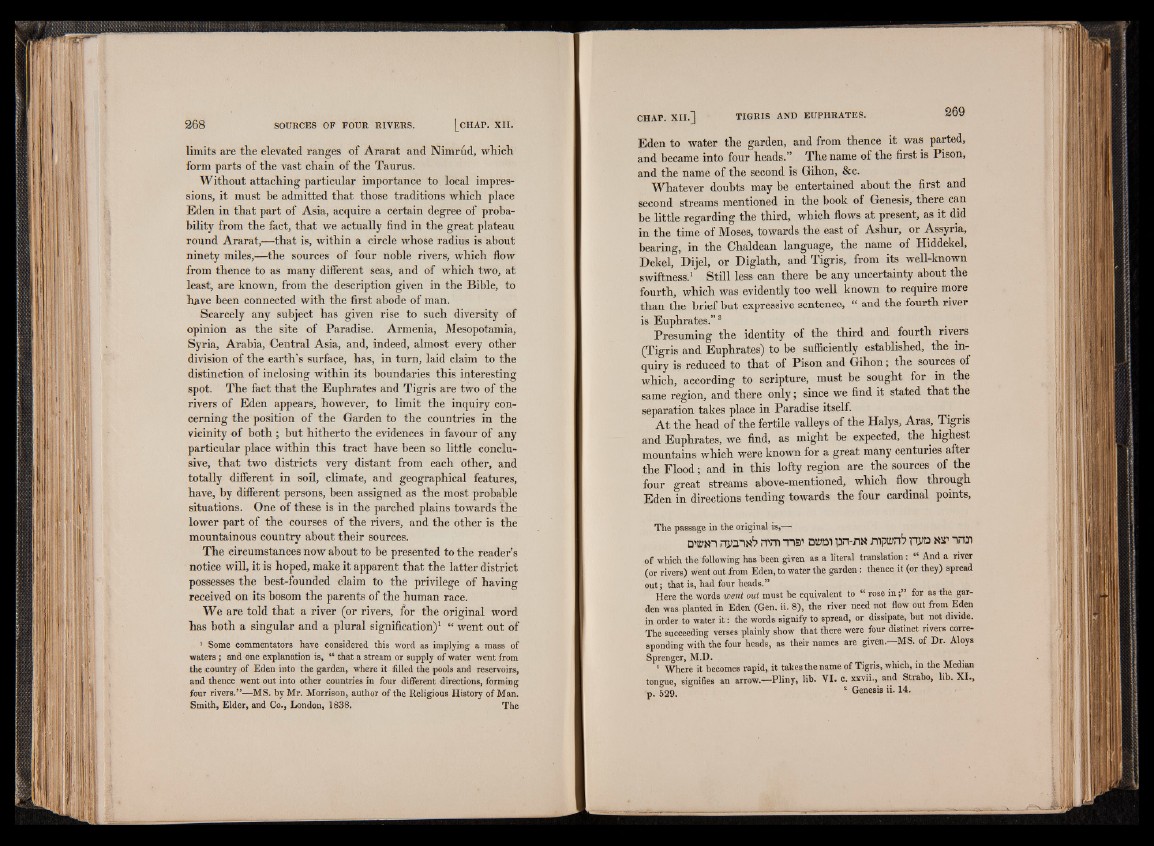
limits are the elevated ranges of Ararat and Nimrud, which
form parts of the vast chain of the Taurus.
Without attaching particular importance to local impressions,
it must be admitted that those traditions which place
Eden in that part of Asia, acquire a certain degree of probability
from the fact, that we actually find in the great plateau
round Ararat,—that is, within a circle whose radius is about
ninety miles,— the sources of four noble rivers, which flow
from thence to as many different seas, and of which two, at
least, are known, from the description given in the Bible, to
have been connected with the first abode of man.
Scarcely any subject has given rise to such diversity of
opinion as the site of Paradise. Armenia, Mesopotamia,
Syria, Arabia, Central Asia, and, indeed, almost every other
division of the earth’s surface, has, in turn, laid claim to the
distinction of inclosing within its boundaries this interesting
spot. The fact that the Euphrates and Tigris are two of the
rivers of Eden appears, however, to limit the inquiry concerning
the position of the Garden to the countries in the
vicinity of both ; but hitherto the evidences in favour of any
particular place within this tract have been so little conclusive,
that two districts very distant from each other, and
totally different in soil, climate, and geographical features,
have, by different persons, been assigned as the most probable
situations. One of these is in the parched plains towards the
lower part of the courses of the rivers, and the other is the
mountainous country about their sources.
The circumstances now about to be presented to the reader’s
notice will, it is hoped, make it apparent that the latter district
possesses the best-founded claim to the privilege of having
received on its bosom the parents of the human race.
We are told that a river (or rivers, for the original word
has both a singular and a plural signification)1 “ went out of
1 Some commentators have considered this word as implying a mass of
waters; and one explanation is, “ that a stream or supply of water went from
the country of Eden into the garden, where it filled the pools and reservoirs,
and thence went out into other countries in four different directions, forming
four rivers.”—MS. hv Mr. Morrison, author of the Religious History of Man.
Smith, Elder, and Co., London, 1838. The
Eden to water the garden, and from thence it was parted,
and became into four heads.” The name of the first is Pison,
and the name of the second is Gihon, &c.
Whatever doubts may be entertained about the first and
second streams mentioned in the book of Genesis, there can
be little regarding the third, which flows at present, as it did
in the time of Moses, towards the east of Ashur, or Assyria,
bearing, in the Chaldean language, the name of Hiddekel,
Dekel, Dijel, or Diglath, and Tigris, from its well-known
swiftness.1 Still less can there be any uncertainty about the
fourth, which was evidently too well known to require more
than the brief but expressive sentence, “ and the fourth river
is Euphrates.”2
Presuming the identity of the third and fourth rivers
(Tigris and Euphrates) to be sufficiently established, the inquiry
is reduced to that of Pison and Gihon; the sources of
which, according to scripture, must be sought for in the
same region, and there only; since we find it stated that the
separation takes place in Paradise itself.
At the head of the fertile valleys of the Halys, Aras, Tigris
and Euphrates, we find, as might be expected, the highest
mountains which were known for a great many centuries after
the Flood; and in this lofty region are the sources of the
four great streams above-mentioned, which flow through
Eden in directions tending towards the four cardinal points,
The passage in the original is,—
D'twn ruuiN1? nvn t®1’ attiDi prwiN ftptwib nya b&r -irui
of which the following has been given as a literal translation: “ And a river
(or rivers) went out from Eden, to water the garden: thence it (or they) spread
out; that is, had four heads.”
Here the words went out must he equivalent to “ rose i n f o r as the garden
was planted in Eden (Gen. ii. 8), the river need not flow out from Eden
in order to water i t : the words signify to spread, or dissipate, hut not divide.
The succeeding verses plainly show that there were four distinct rivers corresponding
with the four heads, as their names are given.—MS. of Dr. Aloys
Sprenger, M.D. _ . .
1 Where it becomes rapid, it takes the name of Tigris, which, m the Median
tongue, signifies an arrow.—Pliny, lib. VI. c. xxvii., and Strabo, lib. XI.,
p . 529. * Genesia J,‘ 14‘